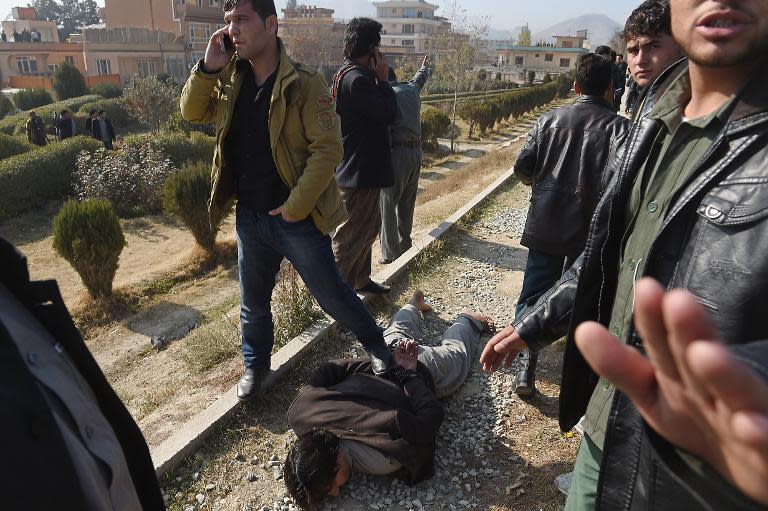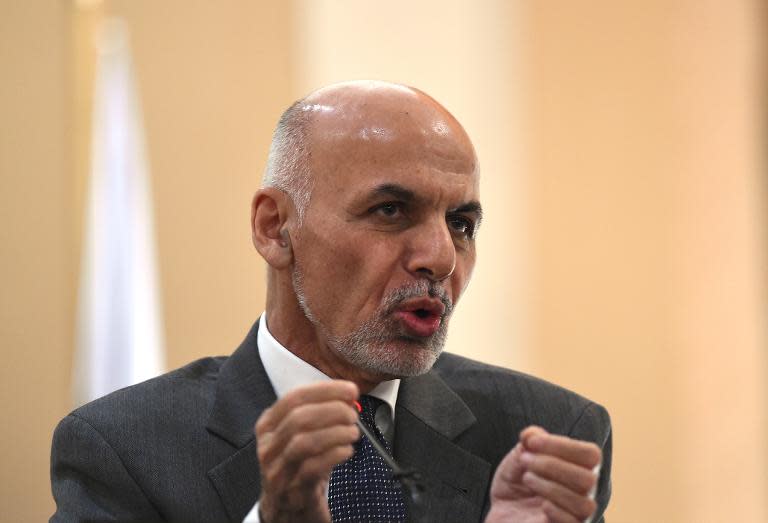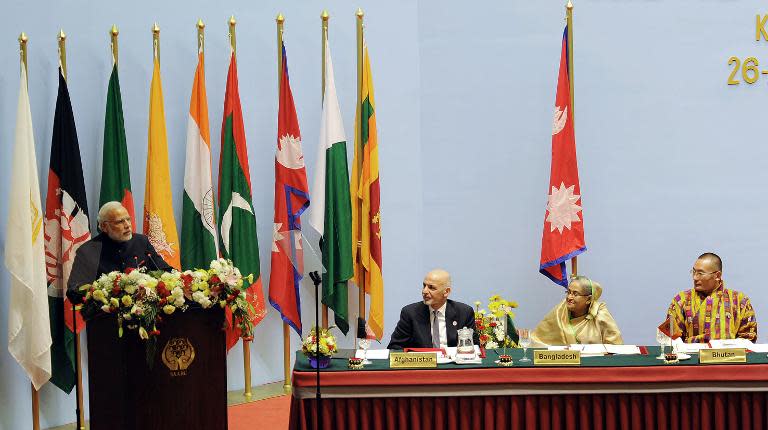Ghani warns against Afghan 'proxy war' at South Asia summit
Afghanistan's new president told the leaders of India and Pakistan on Wednesday he will not let his country become the battleground for a proxy war, as the enmity between South Asia's arch-rivals cast a shadow over a regional summit. Nuclear-armed neighbours India and Pakistan -- bitter and sometimes bloody rivals since gaining independence from Britain in 1947 -- have long accused each other of using proxy forces to try to gain influence in Afghanistan. But the imminent departure of NATO combat troops from Afghanistan has raised fears that rivalry could escalate, further destabilising the two countries' troubled neighbour as it tries to rebuild after decades of war. President Ashraf Ghani issued his warning to South Asian leaders meeting in the Nepalese capital Kathmandu to try to reinvigorate regional cooperation held back by decades of rivalry between India and Pakistan. "We will not allow our territory to be used against any of our neighbours. But we will not permit anybody to conduct proxy wars on our soil either," Ghani told leaders including Indian Prime Minister Narendra Modi and Pakistan's Nawaz Sharif. Ghani's predecessor Hamid Karzai had close ties with New Delhi, and on Wednesday the new president accepted an invitation to visit India in 2015 during his first face-to-face talks with Modi. India, the largest regional investor in Afghanistan, is building a huge new parliament in Kabul and funding new roads and dams amongst other infrastructure and reconstruction projects. Karzai had a more fractious relationship with Pakistan, and frequently accused Islamabad of trying to destabilise the Afghan government by giving sanctuary to Taliban fighters. Only last week, former Pakistani president Pervez Musharraf warned that the departure of NATO troops could provoke a proxy Indo-Pakistan war involving members of Afghanistan's rival ethnic groups. Without mentioning Pakistan by name, Ghani said state sponsorship of non-state actors could have "blowback effects", and described the aftermath of a suicide blast at a volleyball game in Afghanistan that killed 57 people on Sunday. "To hold wounded children in one's arms in a hospital, as I was late Sunday evening, is to feel the depth of our fall from our sense of shared humanity and the values of our great religions," he said. - Call to fight poverty - The leaders of the eight South Asian Association for Regional Cooperation (SAARC) countries are meeting for the first time since the election of a new Indian government eager to improve ties in the face of growing Chinese influence in its backyard. Regional leaders stressed the need for greater cooperation to combat poverty in South Asia, where cross-border trade remains minimal due to mistrust and weak infrastructure. "My vision for our region is a dispute-free South Asia where instead of fighting each other we jointly fight poverty, illiteracy, disease, malnourishment and unemployment," said Sharif. But the summit, which comes just weeks after some of the worst cross-border violence in the disputed region of Kashmir for a decade, is already being overshadowed by the rivalry between India and Pakistan. During his speech Modi pointedly referred to deadly attacks in Mumbai exactly six years ago, which were blamed on Pakistani militants and led to the collapse of peace talks between the two countries. "In 2008 we felt the endless pain of lost lives. Let us work together to fulfil the pledge we have taken to combat terrorism and transnational crime," he said. - Ball in India's court - Modi scheduled one-on-one talks with all the SAARC leaders except Sharif, according to an Indian official who said Islamabad had not requested a meeting. Sharif said the ball was in India's court after it cancelled senior-level talks earlier this year. Hopes of a move towards reconciliation were raised when Modi invited Sharif to his swearing-in ceremony, but his right-wing nationalist government has adopted a more aggressive policy on Pakistan than its centre-left predecessor. "SAARC's main problem is that SAARC is basically about India and Pakistan, with the Afghanistan dimension thrown in now," said Sujeev Shakya, chairman of the Nepal Economic Forum. Modi said India would lead a drive to increase regional trade, committing to reduce his country's large trade deficit with other South Asian nations and make it easier for goods to cross its borders. He also pledged to launch a communications satellite dedicated to the SAARC nations by 2016. Trade between them -- Afghanistan, Bangladesh, Bhutan, India, Nepal, the Maldives, Pakistan and Sri Lanka -- has grown from under $140 million in 2008 to $878 million in 2012, but still accounts for less than five percent of the region's total commerce.






